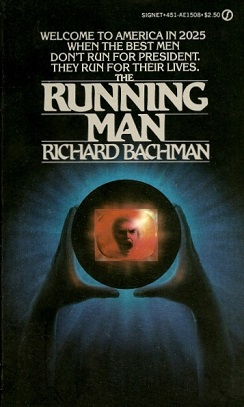Firestarter
by Stephen King
Andy and Charlene "Charlie" McGee are a father-daughter pair on the run from a government agency known as The Shop. During his college years, Andy had participated in a Shop experiment dealing with "Lot 6", a drug with hallucinogenic effects similar to LSD. The drug gave his future wife, Victoria Tomlinson, minor telekinetic abilities, and him an autohypnotic mind domination ability he refers to as "the push". They both also developed telepathic abilities. Andy's and Vicky's powers were physiologically limited; in his case, overuse of the push gives him crippling migraine headaches and minute brain hemorrhages, but their daughter Charlie developed a frightening pyrokinetic ability, with the full extent of her power unknown. (Although much later in the novel, Charlie develops an inner conviction that she will eventually be powerful enough to "change the sun" in some way.) The novel begins in medias res with Charlie and Andy on the run from Shop agents in New York City. We learn through a combination of flashbacks and current narration that this is the latest in a series of attempts by the Shop to capture Andy and Charlie following an initial disastrous raid on the McGee family's quiet life in suburban Ohio. After years of Shop surveillance, a botched operation to take Charlie leaves her mother dead; Andy, receiving a psychic flash while having lunch with work colleagues, rushes home to discover his wife murdered and his daughter kidnapped. He then uses his push ability to track the slightly-cold trail of Charlie and the Shop agents, catching up to them at a rest stop on the Interstate. He uses the push to incapacitate the Shop agents, leaving one blind and the other comatose. Charlie and Andy flee and begin a life of running and hiding, using assumed identities. They move several times to avoid discovery before the Shop catches up to them in New York.
Using a combination of the push, Charlie's power, and hitchhiking, the pair escape through Albany, New York and are taken in by a farmer named Irv Manders near the fictional town of Hastings Glen, NY; however, they are tracked down by Shop agents, who attempt to kill Andy and take Charlie at the Manders farm. At Andy's instruction, Charlie unleashes her power, incinerating the entire farm and fending off the agents, killing a few of them. With nowhere else to turn, the pair flee to Vermont and take refuge in a cabin that had once belonged to Andy's grandfather.
With the Manders farm operation disastrously botched, the director of the Shop, Captain James Hollister, or "Cap", calls in a Shop hitman named John Rainbird to capture the fugitives. Rainbird, a Cherokee and Vietnam veteran, is intrigued by Charlie's power and eventually becomes obsessed with her, determined to befriend her and eventually kill her. This time the operation is successful, and both Andy and Charlie are taken by the Shop.
The pair is separated and imprisoned at the Shop headquarters, located in the fictional D.C. suburb of Longmont, Virginia. With his spirit broken, Andy becomes an overweight drug addict and seemingly loses his power, and is eventually deemed useless by the Shop. Charlie, however, defiantly refuses to cooperate with the Shop, and does not demonstrate her power for them. Six months pass until a power failure provides a turning point for the two: Andy, sick with fear and self-pity, somehow regains the push - subconsciously pushing himself to overcome his addiction - and Rainbird, masquerading as a simple janitor, befriends Charlie and gains her trust.
By pretending to still be powerless and addicted, Andy manages to gain crucial information by pushing his psychiatrist. Under Rainbird's guidance, Charlie begins to demonstrate her power, which has grown to fearsome levels. After the suicide of his psychiatrist, Andy is able to meet and push Cap, using him to plan his and Charlie's escape from the facility, as well as finally communicating with Charlie. Rainbird discovers Andy's plan, however, and decides to use it to his advantage.
Andy's plan succeeds, and he and Charlie are reunited for the first time in six months. Rainbird then interrupts the meeting at a barn, planning to kill them both. A crucial distraction is provided by Cap, who is losing his mind from a side effect of being pushed. Andy pushes Rainbird into leaping from the upper level of the barn, breaking his leg. Rainbird then shoots Andy in the neck. Rainbird then fires another shot at Charlie, but she uses her power to melt the bullet in midair and then sets Rainbird and Cap on fire. A mortally wounded Andy then instructs Charlie to take revenge with her power and inform the public, to make sure the government cannot do anything like this ever again, and dies. A grief-stricken and furious Charlie then sets the barn on fire. She exits the barn and people start going after her. She uses her pyrokinesis to kill the employees and blow up their getaway vehicles. People try to flee and some do. Military men are called, but Charlie blows up their vehicles and when they fire at her she melts their bullets. Charlie blows up the building, shooting it sky-high. She leaves the Longmont facility burning, with almost all of its workers dead.
The event is covered up by the government, and released to the papers as a terrorist firebomb attack. The Shop quickly reforms, under new leadership, and begins a manhunt for Charlie, who has returned to the Manders farm. After some deliberation, she comes up with a plan and leaves the Manders', just ahead of Shop operatives, and heads to New York City. She decides on Rolling Stone magazine as an unbiased, honest media source with no ties to the government, and the book ends as she arrives to tell them her story.
 The Running Man
The Running Man

